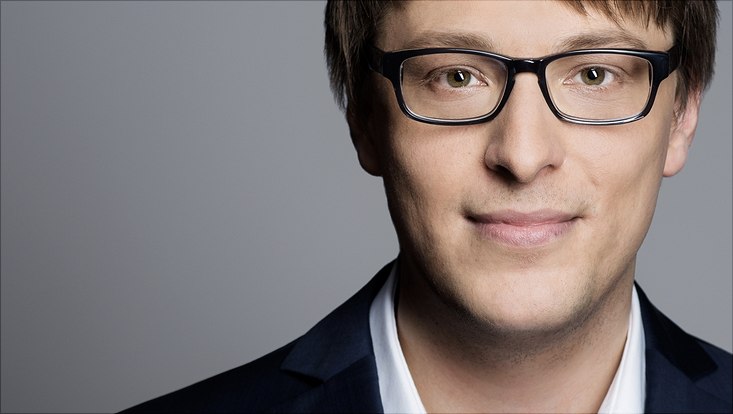Dr. Reto Rössler
Curriculum
Reto Rössler is a literary and cultural scientist. He joined the Department of German Studies at Europa-Universität Flensburg in 2017, where he teaches German literature as well as in the study programs European Cultures & Society (B.A.) and Transformation Studies (M.A.).
He studied German Literature and Philosophy at the University of Trier, where he received his M.A. (Magister Artium) in 2011 (mit Auszeichnung). He was a scholar in the binational PhD-program Das Wissen der Literatur / The Knowledge of Literature at Humboldt-University Berlin and completed his PhD in 2018 (summa cum laude). His dissertation Weltgebäude. Poetologien kosmologischen Wissens der Aufklärung was published in 2020 (Wallstein-Verlag).
He was a research assistant for German Studies at the University of Trier (2011-12), at the Sonderforschungsbereich 600: Strangers and Poor People. Changing Patterns of Inclusion and Exclusion from Classical Antiquity to the Present Day (2010-11), and in the DFG-project ›Essay‹ and ›Experiment‹. Concepts of Experimentation between Science and Literature (1700-1960) at the University of Innsbruck (2015-2017). In 2013, he was a Visiting Graduate Student at Princeton University (USA) and in 2015, a Visiting Scholar at the Research Center Erfurt / Gotha (Herzog-Ernst scholarship).
His research interests include the history of literature and knowledge, intercultural literary studies as well as metaphorology and the history of concepts. In his recent project, he focuses on the literary and cultural-philosophical concepts of Europe in Classical Modernism; he also participates in the trinational working group BorderComplexities and is co-editor of the book series Ähnlichkeiten (Aisthesis-Verlag).
Publications (selection)
- Weltgebäude. Poetologien kosmologischen Wissens der Aufklärung. Göttingen: Wallstein 2020.
- (K)ein »Roman über das Weltall«. Goethes Sternwartenszene der »Wanderjahre« und die Transformation(en) des kosmologischen ›Weltgebäudes‹ der Aufklärung, in: Goethe Jahrbuch 137 (2020) (im Erscheinen) (forthcoming).
- Astronoetik. Blumenbergs kopernikanische Poetologie, in: Leistungsbeschreibung. Literarische Strategien bei Hans Blumenberg, ed. by Ulrich Breuer and Timothy Attanucci. Heidelberg: Winter 2020 (forthcoming).
- Welt-Gebäude, Naturgemälde und Diagramm. Zur Musealisierung der ›ganzen Natur‹ in der Aufklärung und in Alexander von Humboldts »Kosmos«, in: Museales Erzählen. Dinge, Räume, Narrative, ed. by Johanna Stapelfeldt, Ulrike Vedder and Klaus Wiehl. Paderborn: Wilhelm Fink 2020, pp. 115−137.
- with Gunhild Berg and Martina King (eds.): Metaphorologien der Exploration und Dynamik 1800/1900. Historische Wissenschaftsmetaphern und die Möglichkeiten ihrer Historiographie (= Archiv für Begriffsgeschichte; Bd. 59). Hamburg: Meiner 2018.
- Vom Versuch. Bauteile zur Zirkulationsgeschichte einer impliziten Gattung der Aufklärung. Berlin: Kadmos 2017.
- with Tim Sparenberg and Philipp Weber (eds.): Kosmos und Kontingenz. Eine Gegengeschichte. Paderborn: Fink 2016.
Research project: ›Grundkräfte‹ / Basic Forces. Duplicity and Interrelation of Cosmic and Cultural Force Topoi in Aby Warburg, Ernst Cassirer and Hans Blumenberg
In the studies of the Warburg Circle on European Renaissance astrological and astronomical forces evolve from objects of description to categories of theoretical representation: Here, ›cultural forces‹ serve as an operator to reconstruct common epistemic problems, styles of thinking and practices of knowledge in their interrelation through different fields and disciplines. In this way, with the survey of astrology and astronomy and their impact on early modern philosophy, religion and art the Warburg Circle stands in an intellectual line of modern attempts to reflect and re-model culture as a dynamic and permanently self-renewing category through a cosmological detour.
In my project, I want to focus on concepts of ›force‹ in Aby Warburgʼs Pagan-Antique Prophecy in Words and Images in the Age of Luther (1920) and Ernst Cassirerʼs The Individual and the Cosmos in Renaissance Philosophy (1927). I would like to put forward the hypothesis that both, Cassirer and Warburg, adapted the cosmological concept of ›Grundkraft‹ in their cultural theories, but in a quite different way. Thus, the analysis of the duplicity and interrelation of force topoi will give us a better understanding of similarities and differences between early conceptualizations of visual studies (Warburg) and the history of ideas (Cassirer). In addition, I would like to refer to Hans Blumenberg and his reception of cosmology and copernicanism, as a significant example for the intellectual climate of the early post-war era in Germany: While stressing his affinity to the ideas of the latter in general, the metaphorologist and metaphorical writer Blumenberg noticeably remained cautious about the idea of ›cultural forces‹.
Research results: Formative Forces of European Culture(s) (Ernst Cassirer)
The initial thesis of an interweaving of cosmic and cultural forces in the case studies of the Warburg circle can be substantiated through Ernst Cassirerʼs reading of Nicolaus Cusanus in his essay The Individual and the Cosmos in Renaissance Philosophy. According to Cassirer, the intellectual tension of the Renaissance is characterized by the confrontation of the natural forces within the neoplatonic model of cosmological spheres and the individual ›work of thought‹ which forms culture and likewise modern subjectivity.
Through the historico-cultural adaptation of the concept of ›force‹, which aims at the reconstruction of epistemic events and interactions within the research practice of an epoch, Cassirer breaks away from contemporary forms of an immanent historiography (underlying the categories of ›work‹, ›author‹ or ›discipline‹). In this way, his thinking was groundbreaking to recent approaches in literary and cultural theory such as Hans Blumenbergʼs ›Metaphorology‹ or the fields of ›Science and Technology Studies‹ (STS) and ›Poetics of knowledge‹.
In a further step of my research (as part of my postdoc project) it is planned to analyze Cassirerʼs philosophy in detail against the background of the discourse on ›Europe‹ which intensified in the literary field after 1914. Conceived as a play of forces, non-substantial but relational concepts of culture imply the idea of transitions and transfers opposite to robust forms of ›spirit‹ or ›nation‹ – by this they also lead the way towards an intercultural line in modernism.

